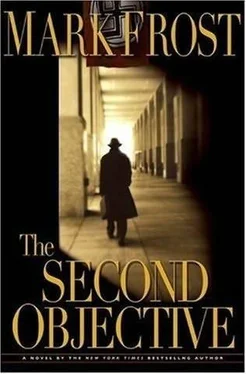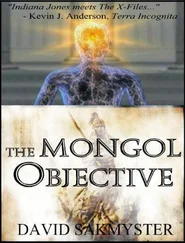Bernie sat on his helmet beside a Christmas tree near the entrance of the admitting tent. Every time an officer passed, he agonized about whether he should take him aside and identify Von Leinsdorf as a spy. Once they had the German in custody, he might be able to blend into the chaos and fade away. But the thought of a second objective held him back. Von Leinsdorf wouldn’t crack even if they tortured him, of that he was sure; he’d sneer at a firing squad while they tied the blindfold on. Bernie didn’t know how many others in their brigade had been assigned this second objective, so unless he found out what it was, he couldn’t do a thing to stop it. Until then he needed Von Leinsdorf alive and in the clear. But how many others would he kill before then? That was the equation he had to live with. Now that the attack had started, trying to surrender would only get himself shot. He kept his head down, picked up a newspaper, and tried to shrink into the corner.
It was the American service paper, Stars and Stripes. His eye was drawn to a headline on the front page.
ALLIES BOMB IG FARBEN
German Industrial Giant Near Frankfurt Hit Hard
Daylight Raid Leaves Nazi War Machine Reeling
His father still worked at IG Farben. He’d had no contact with his family since leaving for Grafenwöhr in October, at which point both his parents were alive. That suddenly seemed in doubt.
Bernie’s gaze drifted to the improvised Christmas tree, gauze serving as tinsel, surgical clamps and scissors hung like ornaments. The meager attempt at holiday cheer, his own peril, and the growing crowd of wounded arriving for treatment brought him to the verge of tears. A nurse’s aide offered him a cup of coffee. He declined, and his forlorn look drew her sympathy.
“Hard being away from home this time of year, isn’t it?” she asked.
He looked up at her. She was a plain girl, early twenties, with crooked teeth and a one-sided smile.
“I guess you could say that,” said Bernie.
“I love Christmas. Never spent one like this before. Where you from?”
“Brooklyn,” he said, surprised when it came out of his mouth.
“Really? We sailed out of the Brooklyn yard on our way over a few weeks ago. You’ll be happy to know it’s still there. I’m from Wichita. That’s a long way from New York. Might even be farther away from it than where we are now.”
“I don’t think you can get any farther away than this.”
“Don’t worry now, you’ll be going home soon,” she said.
She patted him on the back. Her kindness made it hard for him to say anything more. He spotted Von Leinsdorf coming toward him through the room, wearing a doctor’s white coat, and stood up.
“Get in the jeep,” said Von Leinsdorf. “Keep the engine running.”
“Where are you going?”
“Make sure you’re pointed toward the road,” he said, taking off the coat and heading back toward the prep tent.
“I want an autopsy,” said Grannit. “I need to know what killed him.”
“Could have been any number of things,” said the surgeon who’d worked on Mallory, not eager to oblige. “Postoperative trauma, delayed reaction to anesthesia-”
“His original wounds were enough to kill him,” said a second doctor.
“We were told he’d come through that surgery, that he’d recover,” said Grannit.
“The truth is, Lieutenant, these things aren’t predictable,” said the surgeon. “We see it every hour of every day. Each man has a different breaking point. Sergeant Mallory reached his.”
Grannit looked at the weary doctors in their blood-soaked gowns-decent men, trained to heal, not kill. He could hardly expect a different reaction: What was one more dead soldier? After watching so many young men lose their lives, what else could they do but turn up their hands?
A passing nurse overheard the name. “Did you say Mallory?”
“That’s right,” said Grannit.”
“But he hasn’t even gone into surgery yet.”
“Yes he did, he was postop.”
“When did they operate?”
“Last night when he came in.”
“But I just admitted him fifteen minutes ago.”
“What’s the first name?” asked the surgeon, looking at the chart. “We can’t be talking about the same Mallory.”
“First name’s Vincent,” said Grannit. “Vincent Mallory.”
“Sergeant Vincent Mallory, that’s him,” said the admitting nurse. “I just took the information off his tags-”
“Where is he now?”
“In the prep tent.”
“Show me,” said Grannit.
They hurried toward the tent, burst through the flaps, and searched down the busy rows, the doctors following.
“Did he come in alone?” asked Grannit.
“No, a couple of soldiers brought him in-”
The admitting nurse pulled back the curtain isolating his cubicle. Gunther Preuss lay on the cot, an IV in his arm, bright red blood sliding from his mouth and nose, his body racked with convulsions.
The nurse and doctors hurried to the patient’s side, calling for help. Grannit caught movement out of the corner of his eye. An officer in uniform walking against traffic out of the tent at a rapid pace. Grannit took off after him, pulling his Colt, holding it aloft so people would notice.
“Out of the way!”
The crowd parted, some hitting the floor in alarm. The officer heard the shouts and, without looking back, sprinted out the front of the tent. Grannit hurdled a cot, bowled over a couple of soldiers, and jammed his way out after him.
A jeep was pulling out of the parking area, wheels skidding in the mud. Two men on board. Grannit saw the officer he’d followed haul himself into the front seat as it slipped away. The glint of silver bars on his collar. A lieutenant. No stripes on the driver’s jacket, a private.
Grannit gave chase to the edge of the parking area, aiming the pistol but unable to sight a clear shot. He waved down a motorcycle dispatcher, flashed his badge to the driver, then yanked him off the bike when he slowed and jumped on. Jacking the bike around, he downshifted to gain torque in the mud and slid onto the narrow road heading into Malmédy. He spotted the jeep a quarter of a mile ahead crossing a small bridge into town. Grannit downshifted again and opened the throttle.
“Keep going,” said Von Leinsdorf to Bernie. “Head southeast.”
“What happened? Where’s Preuss?”
“Just do as I tell you,” said Von Leinsdorf, glancing behind them.
Bernie whipped the jeep around the town center, a welter of narrow, ancient streets, avoiding collisions, wheeling around obstacles, ignoring traffic signs. The sidewalks were packed with citizens carrying suitcases and bags, pushing carts full of possessions, fleeing from the German advance. Twice he narrowly missed civilians who darted suddenly into the street, one carrying a bright green parrot in a cage. As they reached a narrow bridge leading out of town, they came face-to-face with an American half-track headed the other way. Bernie steered to the right without slowing and accelerated past it, only inches to spare, the jeep’s right fender sending up sparks as it scraped against the stone wall.
Behind them, Grannit dodged through oncoming traffic, weaving around slower cars and trucks. Crossing the first bridge into town, he veered into an intersection and nearly collided with a stalled wagon. Turning hard right, he jumped the bike up onto a sidewalk, leaned on the horn, and shouted for people to clear out of his way. He skirted a group of Allied soldiers organizing a defense along the town’s eastern perimeter on the near side of a second bridge. Halfway across the bridge, he slammed on the brakes when a column of American vehicles barreled into the village. Grannit stood up on the bike, looked ahead, and caught sight of the jeep across the bridge, moving down a long straightaway into the country. Some MPs jumped out of a jeep to set up a roadblock and direct traffic. Grannit shouted at them, showed him his badge.
Читать дальше












